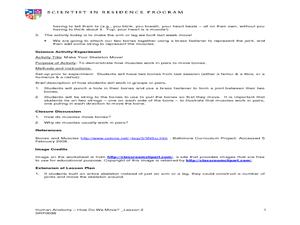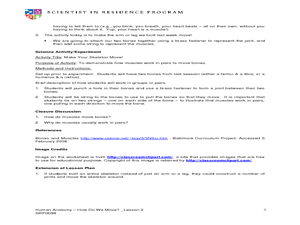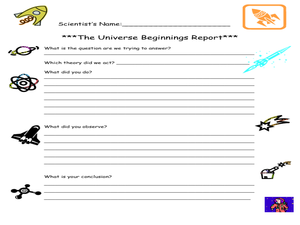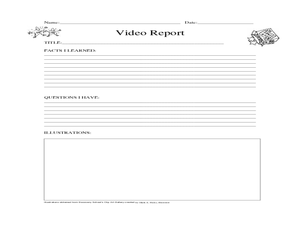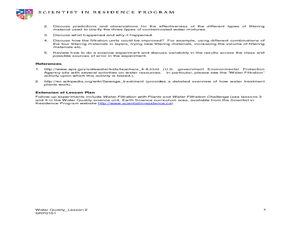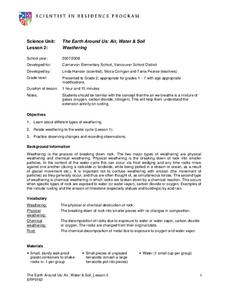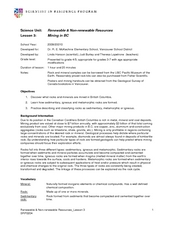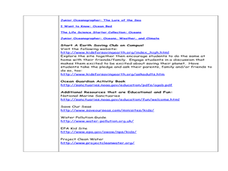Curated OER
Human Anatomy- How Do We Move?
Students examine the muscular system. In this muscular system instructional activity, students first draw a realistic representation of their leg or arm bones. Students do several activities to attach these bones to "joints" with...
Curated OER
Human Anatomy - How Do We Move?
Fifth graders discover how blood moves around the body. In this circulatory system lesson, 5th graders feel their pulse before and after exercise. Students count their heart rate. Students use the scientific method to record...
Curated OER
Human Anatomy- How Do We Move?
Learners explore the human anatomy. In this respiratory system lesson, students conduct an experiment to simulate the capacity of human lungs.
Curated OER
Human Anatomy -- How Do We Move?
Students create a model of the digestive system. In this human anatomy instructional activity the students examine features of the digestive system. The students perform an experiment.
Curated OER
The Nervous System
Young scholars investigate the nervous system. In this anatomy lesson, students identify and define vocabulary related to the nervous system. Young scholars role play the parts of a nervous system and perform an experiment...
Curated OER
Force and Motion
Students experiment with force and motion. For this force and motion lesson, students test gravity using a variety of objects. Students rotate through a series of stations which use force, motion, friction, and inclines. Students predict...
Curated OER
Introduction to the Scientific Method
Students participate in an experiment and learn to record it using the scientific method. In this biodegradable plastics lesson plan, students follow the scientific method to complete an inquiry. Students complete an experiment...
Curated OER
Introduction to the Scientific Method
Young scholars recognize and follow the steps of the scientific method to complete an experiment. In this scientific method lesson, students use inquiry tools to measure objects. Young scholars record their data.
Curated OER
Space: The Universe As We Know It!
Learners simulate the Big Bang. In this lesson on the origin of our universe, students role play to show how the Big Bang explosion may have created our universe.
Curated OER
How Hot and How Big?
Students explore star color and size. In this space science instructional activity, students conduct various inquiry activities to explore how the color of a star affects the amount of heat produced. They also investigate how the color...
Curated OER
Water Quality: Water Filtration
Students build a water filtration system. In this water quality lesson plan, students work in groups to construct water filtration units that can purify contaminated water. This lesson plan is part of a larger unit on water quality.
Curated OER
Water filtration with Plants
Sixth graders explain how soil and plants effect contaminated water in nature. In this filtration lesson, 6th graders work in groups to test biofiltration units. Students determine which biofiltration units work best and how they...
Curated OER
Weathering
Second graders explore weathering and how the water cycle plays a part in weathering. For this weathering lesson, 2nd graders put gravel and sugar cubes in a jar and shake, simulating weathering. Students use the scientific method...
Curated OER
Worm Composting
Second graders discuss worm composting. In this decomposition lesson plan, 2nd graders look at the anatomy of the worm and how it eats food. They have their own worm bin and review what foods can and can not be given to the worms for...
Curated OER
Rubber Duckies and Ocean Currents
Students explore marine life by conducting a rubber duck experiment. In this water currents lesson, students practice identifying latitude and longitude coordinates on a map and define the currents of major oceans. Students discuss the...
Curated OER
Oil Spill Cleanup
Students participate in an oil spill simulation and how to clean it up. For this oil spill lesson plan, students also calculate the cost of the clean up of an oil spill.
Curated OER
Biomes of the World (and Canada)
Young scholars explore environments by analyzing food chains. In this biome identification lesson, students define a list of environmental vocabulary terms such as tundra, rain-forest and desert. Young scholars create a fictional self...
Curated OER
Ecological Impact of River Dams
Students investigate their environment by completing an in-class experiment. For this ecological lesson, students define the roles of dams and how electricity is created by them. Students utilize plastic jugs, sand and tap...
Curated OER
Renewable and Non-Renewable Resources: Mining in B.C.
Students explore energy by categorizing rocks. In this British Columbia geology lesson, students define many different vocabulary terms associated with mining such as sedimentary, igneous, and metamorphic. Students utilize sample rock...
Curated OER
Earth Energy Budget Pre Lab
Learners explore energy by conducting an in class experiment. In this climate change instructional activity, students conduct a water vapor experiment in a soda bottle. Learners utilize graphs and charts to analyze the results of the...
Curated OER
Winter Season
Students recognize the relationship between Earth's tilt and the Winter season. In this Winter activity, students work in pairs to complete make frost and design snow goggles. Students experiment a hand lens to study the frost created....
Curated OER
Weather and Seasons: Mt. Seymour Winter Fieldtrip
Learners explore winter adaptations and glare. In this winter weather lesson, students discuss the season of winter and how animals and plants adapt to the changing weather. Learners discuss the glare off snow and make goggles for their...
Curated OER
Central Park Field Trip
Students visit the park to observe signs of spring in the forest and pond environments. In this field trip lesson, students explore the park for various items
Curated OER
I Can Preserve My Planet
Students explore renewable and nonrenewable resources. In this ocean preservation lesson, students use KWL charts to understand ways the ocean is important to our daily lives. Students create a poster or wirte a letter to someone...

